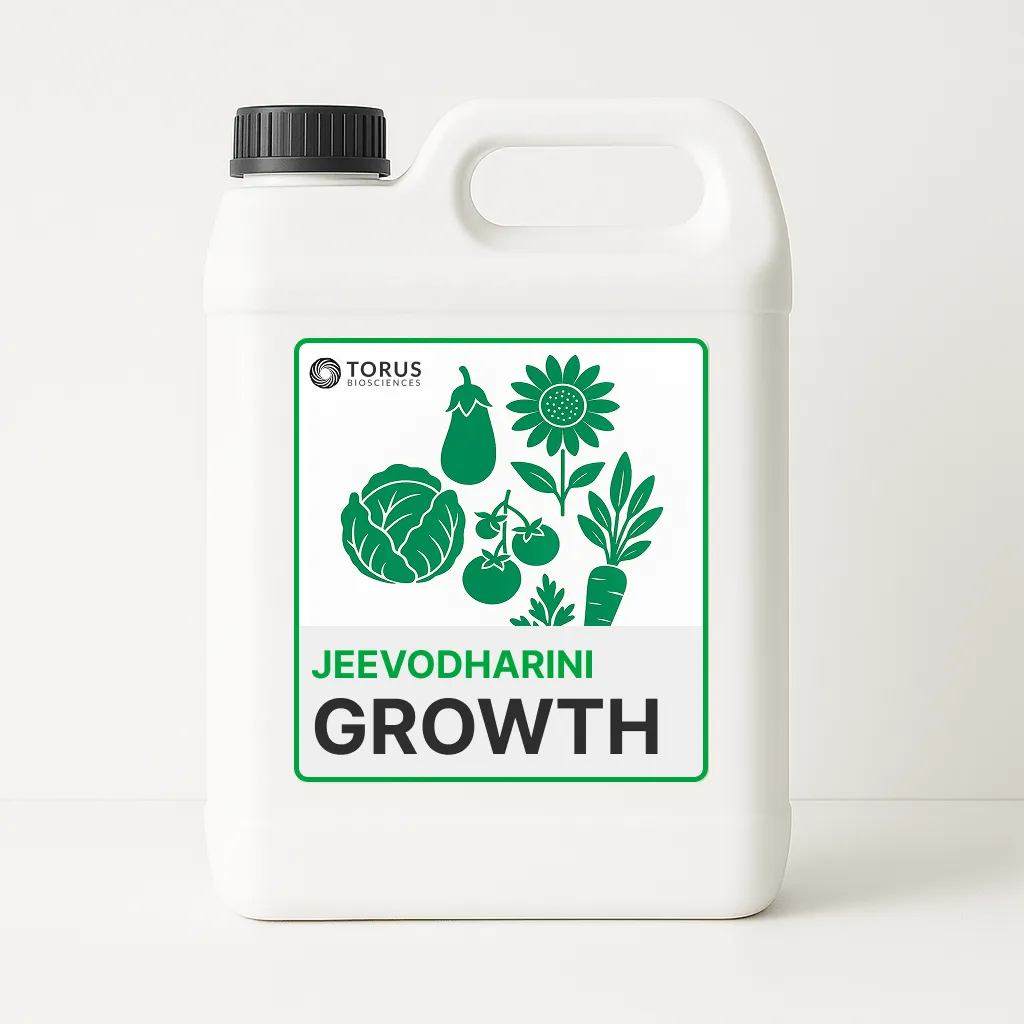
Jeevodharini Growth
A multi-microbial biofertilizer that naturally provides crops with nitrogen, phosphorus, and potassium (NPK) while enhancing root nutrient uptake through Vesicular Arbuscular Mycorrhiza (VAM).

How It Works
Jeevodharini Growth is designed to supply essential macronutrients to plants via beneficial microorganisms rather than chemical fertilizers. By integrating multiple microbes, it provides a balanced nutrient supply: nitrogen through biological fixation, phosphorus and potassium through microbial solubilization, all augmented by mycorrhizal nutrient transfer.
Key Microorganisms
Nitrogen Providers: Free-living Azospirillum bacteria colonize roots and convert atmospheric nitrogen into forms the plant can use. Azospirillum also produces plant hormones that stimulate root branching, promoting greater water and nutrient absorption.
Phosphorus Mobilizers: Phosphate-solubilizing bacteria such as Bacillus megaterium release organic acids and enzymes to dissolve insoluble phosphates in soil.
Potassium Enhancers: Potassium uptake is enhanced by potassium-solubilizing bacteria like Frateuria aurantia, known to release bound potassium from soil minerals, making it available to plants.
Root Enhancers: The product is fortified with Vesicular Arbuscular Mycorrhiza (VAM) fungi that form symbiotic associations with plant roots. VAM extends the root system via fungal hyphae, dramatically improving the uptake of phosphorus and moisture.
Research-Backed Results
Research on such biofertilizer consortia shows improved crop productivity and soil health, as the microbes also secrete vitamins and antioxidants that protect roots from stress. The mycorrhizal component further helps plants resist drought and soil diseases by priming plant immunity and outcompeting soil pathogens.
Overall, Jeevodharini Growth turns the soil into a living nutrient factory, enhancing fertility in a sustainable, eco-friendly manner.
Benefits
-
Nitrogen Fixation: Contains Azospirillum that fixes atmospheric nitrogen, providing natural fertilizer equivalent to a portion of synthetic N. This reduces chemical N requirements and improves green foliage.
-
Phosphorus and Potassium Solubilization: Beneficial Bacillus and Frateuria species solubilize soil phosphorus (P) and potassium (K), increasing nutrient availability to crops. This promotes better root and shoot growth.
-
Enhanced Nutrient Uptake: VAM fungi greatly expand the plant’s ability to absorb nutrients and water. Their hyphae explore soil micro-pores to access phosphorus, zinc, and moisture beyond the reach of roots, resulting in vigorous growth, especially in P-deficient soils.
-
Improved Soil Structure: Microbial activity releases organic acids and polysaccharides that help soil aggregation and humus formation. Over 113 plant species across 35 families have shown growth benefits from such inoculation, demonstrating broad applicability.
-
Reduced Chemical Dependency: Can partially replace chemical NPK fertilizers, lowering input costs. Field trials have demonstrated a 20–30% reduction in chemical fertilizer use while maintaining yields.
-
Disease Resistance: Contains aerobic spore-forming bacteria that control plant diseases from soil-borne pathogens.
-
Drought Tolerance: Increases plant resilience under drought conditions.
-
Growth Promotion: Contains microorganisms that produce plant growth hormones for higher yields.
-
Environmental Safety: Safe and non-toxic to humans, plants, animals, and the environment.
Suitable Crops
Jeevodharini Growth is suitable for virtually any crop and can be effectively used across all agricultural and horticultural applications. Some specific crop categories that particularly benefit include:
-
Cereals and Millets: Particularly effective for rice, wheat, maize, and sorghum, where Jeevodharini’s beneficial microorganisms form strong associations with grass roots, significantly boosting yields.
-
Vegetables: Enhances growth and early vigor in tomatoes, peppers, leafy greens, and other vegetables through improved nutrient uptake.
-
Pulses and Legumes: Benefits peas, soybeans, lentils, and other legumes through P and K solubilization, though additional Rhizobium inoculant is recommended for maximum nitrogen fixation.
-
Cash Crops: High biomass crops like sugarcane, cotton, and corn respond exceptionally well to mycorrhizal inoculation for phosphorus uptake.
-
Fruit Orchards: Establishes strong root networks in banana, coconut, citrus, and other fruit trees, leading to improved long-term growth and yield.
-
Oilseeds: Enhances nutrient availability for crops like sunflower, groundnut, and mustard.
-
Spices and Condiments: Improves growth parameters in turmeric, ginger, chili, and other spice crops.
-
Fiber Crops: Supports healthy development of cotton, jute, and other fiber-producing plants.
-
Ornamental and Medicinal Plants: Promotes robust growth in flowering plants, ornamentals, and medicinal crops.
Jeevodharini Growth is ideal for any cropping system aiming to reduce chemical fertilizer dependency while improving soil fertility and crop productivity.
Mechanism of Action
Each microbe in Jeevodharini Growth plays a specific role in a complementary fashion:
-
Azospirillum not only fixes nitrogen but also releases auxins (IAA) that stimulate root hair proliferation. More root hairs provide more entry points and surface area for mycorrhizal fungi to colonize, strengthening the symbiosis.
-
The mycorrhizal fungi supply phosphorus to both the plant and indirectly to other microorganisms like Azospirillum, creating a mutually supportive microbial ecosystem in the rhizosphere.
-
This interconnected network of beneficial microbes ensures that nutrients cycle efficiently between soil, microbes, and plants.
Synergy with Organic Farming
Jeevodharini Growth works exceptionally well when integrated with organic farming practices:
-
Applying farmyard manure or green manure along with Jeevodharini Growth provides organic matter for the microbes to feed on, boosting their activity and population.
-
The diversity of microbes in the product ensures functional redundancy - if one bacterium doesn’t thrive in a particular soil condition, another will fill its role, ensuring consistent performance across various soil types.
-
The product complements other organic inputs and biological control agents, forming part of a holistic soil health management approach.
Available Variants




Storage & Usage Guidelines
- Store in a cool, dry place (ideally below 30°C) away from direct sunlight.
- The product has a shelf life of 6–12 months when properly stored.
- Proper storage ensures microbial viability remains above the optimal count.
- Shake bottle well before use to ensure even distribution of microbial population.
- Apply to plants early in the morning or in the evenings to limit sun exposure and maximize microbial survival.
- Contains live organisms. Do not mix with bactericides, fungicides, toxic chemicals, or fumigants.
- Wear protective clothing, gloves, and face masks when handling, brewing, and applying the product.
Boost productivity with our sustainable biological solutions.
Trusted by agricultural and waste management professionals for superior results.
Request pricing & availability